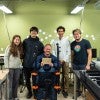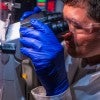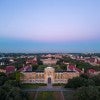
Rice scientists use blood test to track gene expression in the brain
Rice-engineered synthetic serum marker can track gene expression in the brain noninvasively, using blood tests.

Rice scientists use blood test to track gene expression in the brain
Rice-engineered synthetic serum marker can track gene expression in the brain noninvasively, using blood tests.

Why poor sleep quality can be a matter of life and death for migrant roofers
Migrant roofers in the U.S. helping communities rebuild from natural disasters often struggle with poor quality of sleep, according to new research from Rice University. The issue can be a matter of life and death for these individuals, who are working in environments where a sleepy misstep can literally end their life or permanently injure them.

A Rice University study of food aid programs during the pandemic found that cash assistance provided low-income mothers with greater flexibility to feed their families than food distributions.

Blast from the past: Rice remembers Super Bowl VIII as 50th anniversary of game approaches
On a foggy, damp day in Houston on Jan. 13, 1974, just under 72,000 people packed into Rice Stadium to watch the Miami Dolphins take on the Minnesota Vikings in Super Bowl VIII.

Rice mourns loss of Frank Ryan
Frank Ryan, a member of the Rice Athletics Hall of Fame who went on to lead the Cleveland Browns to the NFL title, passed away on Monday at the age of 87.

Owl fans, alumni unite to support Rice football in First Responder Bowl
Owl fans and alumni showed up in full force Dec. 26 to cheer on the Rice football team as it squared off with Texas State University in the SERVPRO First Responder Bowl in Dallas.

’Tis the season of giving . . . and engineering
The holiday season kicked off early this year for a Rice staff member who received a welcome and much-needed gift from a team of freshman engineering students.

Molecular jackhammers’ ‘good vibrations’ eradicate cancer cells
Rice scientists and collaborators at Texas A&M University and University of Texas MD Anderson Cancer Center have found a new way to kill cancer cells by using near-infrared light to make a small dye molecule attached to their membrane vibrate strongly. It is the first time this kind of mechanical molecular action has been used as a potential therapy.

For this emergent class of materials, ‘solutions are the problem’
Rice materials scientists developed a fast, low-cost, scalable method to make covalent organic frameworks (COFs), a class of crystalline polymers whose tunable molecular structure, large surface area and porosity could be useful in energy applications, semiconductor devices, sensors, filtration systems and drug delivery.

Electronic pathways may enhance collective atomic vibrations’ magnetism
A new study from Rice’s RAMBO laboratory and collaborators suggests the magnetism of phonons, collective atomic vibrations, is enhanced by electronic pathways.

Rice’s Moody Center unveils Tomás Saraceno's ‘Crux Australis 68.00’: A fusion of art and engineering
Welcoming visitors to the dedication ceremony hosted by the Moody Center for the Arts, Rice University President Reginald DesRoches expressed appreciation for the university’s newest public art installation, “Crux Australis 68.00,” a structure that spans multiple stories within the Ralph S. O’Connor Building for Engineering Science.

‘A thing like no other’: Rice students care for peers as volunteer EMTs
As the Rice Owls prepare to face off against the Texas State Bobcats in the 2023 SERVPRO First Responder Bowl, a game all about recognizing fire, police and EMT professionals throughout our communities, the spotlight includes the student volunteers of Rice University Emergency Medical Services (REMS).

Rice football’s bowl-clinching victory against Florida Atlantic University last month was not only a testament to the teams hard work and tenacity this season, but for three particular senior Owls, it was the culmination of six years of dedication and perseverance paying off.

Working women feel unsupported by Christian congregations — even more progressive ones
As church membership declines across the United States, a new study from Rice University’s Boniuk Institute for the Study and Advancement of Religious Tolerance finds that working women do not feel supported by their clergy and churches, regardless of whether they’re involved with a more conservative or liberal congregation.

President DesRoches statement on antisemitism
Given this past week’s national developments and debates regarding antisemitism on university campuses, I would like to provide clarity on Rice University’s position.